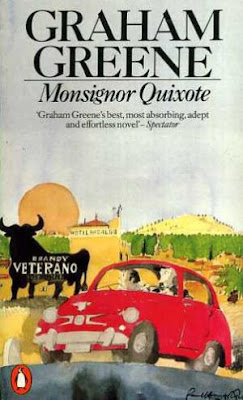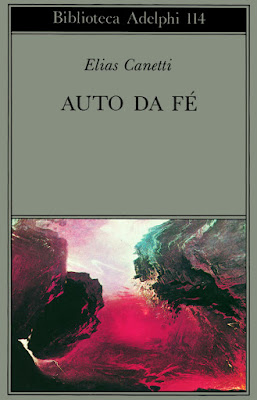Books I've read. Books that have had an impact on me. Books that didn't, but that many believe should have.
Sunday, 10 June 2018
Monsignor Quixote - Graham Greene
And this is the reason why I was saying that I've probably read too many Graham Greene. Despite the quote from a review from The Spectator on the book's cover, the novel is not Greene's best, or the most absorbing, or adept - it is possibly his most effortless though, as it costs the reader nothing to read it, but I'm afraid it also cost Greene very little to write it.
I probably (well, surely actually) didn't like the picaresque tone of it, but with this I'll probably stop reading Greene novels no matter how much I've loved so many of them*
* That's a blatant lie, I might stop after reading The End of the Affair.
Ali Smith - The Accidental
I probably jumped into my second Ali Smith a bit too soon, but I found it on the shelves of the world-famous local farm when all my other books were boxed up for the move, so yeah.
The Accidental is a good book. Problem is, I'm not quite sure if it's more than that. The story is interesting, the characters intriguing, and their reactions during challenging times are the right kind of bonkers (as in, they make the reader want to read about them, not that I condone them!).
Yet, this book lacks something that I can't put my finger on. Or maybe it's just me getting annoyed at the story coming full circle in the final chapter.
Americanah - Chimamanda Ngozi Adichie
Am I an awful human being if I write that I was expecting more from this book, given the nearly universal acclaim? I mean, it's a good book, but I'm not quite sure it's a great one.
One thing that I found a bit disappointing, for instance, is that the cultural reference points of the main characters appear either to be Western or, out of the African names, most are rather "mainstream" (Achebe, Fela Kuti, etc.). The reflections on race are interesting and poignant, but not excessively original - though that's not to downplay their importance. And, crucially, the happy ending is a bit sickening, making me react in the same way in which the cinematic version of Breakfast at Tiffany's had made me react years ago.
The sections in London and (most of the ones in) Nigeria make up for the blandness of some of the American passages, and for the sappy romanticism of the end. And probably I would have enjoyed the American parts a lot more had I not previously read Malcolm X's thoughts about styling black hair...
Labels:
Adichie,
Growing-up,
Immigration,
Love,
Nigerian,
Race
The Dressmaker - Beryl Bainbridge
I've read too many books by McEwan, Greene (I'm afraid), and possibly even Paul Auster - somehow I still haven't had enough of Beryl Bainbridge.
The Dressmaker is probably her most famous work, and at the start that I just found its oppressive atmosphere a bit too oppressive. As the love story between Rita and "her" soldier takes off alongside her illusions and self-deceptions though, so does the book.
Much like with every Bainbridge novel, the reader braces him/herself from the start for what is bound to be a dramatically twisted end. And much like with every Bainbridge novel, no matter how prepared I thought I was, the last few pages still caught me off guard.
Citizen: An American Lyric - Claudia Rankine
A book given to me by the colleague mentioned in one of the recent posts so that I could read something by a contemporary black American woman.
This is a book that I thoroughly enjoyed as it pushed me a bit outside of my comfort zone, and I'm aware of the fact that there were plenty of passages that I didn't get (or at least that I didn't fully get) because, you know, white European male etc.
This doesn't mean that I agreed with all she wrote - in the vignettes I felt like there were a couple of examples of idiots who were plain idiots more than racist idiots (then again, who am I to judge?), I'm still not quite sold on the lip-read of Materazzi's insults to Zidane (obviously, as we also won the World Cup as a result of that), and I really think a fair bit of the hatred Serena Williams receives is because of her dominance rather than the colour of her skin (I'd have preferred a discussion of the challenges faced by Sloane Stephens or James Blake, as they are probably slightly more representative of the very talented black players in a white sport, but then again very few people outside of tennis fans would have found that interesting).
The Sense of an Ending - Julian Barnes
Much like with Ali Smith, at some point I just had to read something by Julian Barnes, so I went for the book that got him the Booker Prize. In all honesty I came in with fairly moderate expectations, and I was pretty much blown away.
I normally want books to have an ending that makes sense (what a glorious pun!), or at the very least one that answers roughly the same number of questions that it leaves unanswered, but I didn't have a problem with this one because it's so majestically written and because throughout its chapters it calls into question not just the reliability of the author, but that of all our individual memories.
The jabs at the pretentiousness of some Cambridge students are also something that makes me giggle and doesn't feel (too) gratuitous, and the references to the wobbly Millennium Bridge make me happy as a Londoner.
Auto da Fé - Elias Canetti
Rarely has a book with such an impressive opening chapter revealed itself to be so challenging to read (though moving to our new flat didn't make the process any simpler I must admit!). And I don't mean a pleasant challenge, I just mean long, repetitive, and to be honest quite dated (in particular with the few traces of humour).
I was surprised to see the book in the Shaw Library, less surprised when I saw that it hadn't been checked out since since the 1970s (no kidding) as I'm not quite sure how many people in the UK even know of Canetti's existence.
The main character's interactions with his young neighbour at the start had me really excited, and up until his marriage proposal I was finding the book quite exciting. After that, however, it just kept on going on and on in a story that could have been told just as effectively (actually, probably more effectively) in 200 pages less. I understand the allegoric madness and book burning in the conclusion, but even that was rather obvious and predictable.
St Urbain's Horseman - Mordecai Richler
Oh, how long since I had last read a Richler novel. Sure, my former Canadian teachers presented him as an awful human being (years before my time there, he came to give a guest lecture at our school and left everyone rather unimpressed), but in terms of North American Jewish writers for me he's right up there with Roth and Bellow.
St Urbain's Horseman doesn't have the epicness of Solomon Gursky Was Here or the comedy and mystery of Barney's Version, but it remains an impressive book. Large sections of the book are set in a London that I don't find too drastically changed in nearly 50 years. The parts about the legendary horseman are wonderful portraits of Canadian life in the first half of the 20th century, and the idea of him looking for Mengele (though not even the narrator actually believes that, probably) are the work of a genius.
Without the Jewish elements I probably wouldn't have enjoyed this book this much. But the fact is, the Jewish elements are very much there and so, unsurprisingly, this book is a winner for me.
The Lost Honour of Katharina Blum - Heinrich Böll
I thought Group Portrait with Lady was too long and lost its magic in the final 50 pages. I now think that The Lost Honour of Katharina Blum is too short and never gets to have much magic in the first place.
As usual, this is a novel about ordinary German people in turbulent times, but either because of its shortness or because of the historical period (though, being Italian, I would have expected to find its take on German political terrorism in the 1970s more interesting), I found this book, for want of a better term, a bit "hmpf"...
And I am now leaving this post much like the book itself - short and a bit pointless
The Handmaid's Tale - Margaret Atwood
Luckily, even in my new job, there is a colleague who reads as much as me. This is the first of five books that she has lent me recently, and one that I enjoyed a fair bit (if one can actually "enjoy" this book).
I'm not excessively fond of dystopian novels, but I have to recognize that this is one of the finest examples. That said, never having been a woman, I'm afraid that a lot of its most disturbing passages don't really hit me as much as they would hit someone of the opposite sex (the ones about the loss of Offred's child, on the other hand, resonate a lot more with me).
I think the greatest demonstration of the fact that I'm not one for dystopian books (despite the fact that every instance of oppression the author describes has happened in history at one point or another) is the fact that, despite liking this book, I'm really in no rush to watch its TV adaptation.
Black Dogs - Ian McEwan
Blogging at 7 am because, well, why not when you have a wife in pain in bed and a daughter not in pain and very, very much out of bed.
I thought I was done with McEwan, but then the Shaw Library presented me with Black Dogs (my mom's favourite McEwan as far as I can recall) and I just grabbed it. And it simply reconfirmed my thoughts about the author: I've simply read way too many of his books.
Black Dogs is flawlessly written, like all of McEwan's books, but I cared so little about the post-war love story between its two main characters that for me it overshadowed the unusual setting of the novel (unusual in the historical era depicted, not that the French countryside is an unusual literary setting).
Subscribe to:
Comments (Atom)










